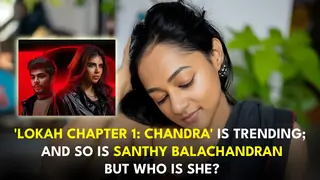Only the best preferred
A study of the history of the Hindi film music industry reveals that in the golden era (1940s and 1950s) so much talent was available that music composers tried different singers for various stars. Once the system settled down, certain groups emerged and survived for years, observes V. GANGADHAR. God created music ... Yes.God created the Mangeshkars ... Okay.God created Monopoly ... Did He? I AM also not sure about the third answer. But many people who follow Hindi film music, associate not God but the Mangeshkars, particularly Lata and Asha (Bhosle) as the creators of Monopoly. Experts in the field had argued eloquently and also written books on how Lata and to a lesser extent, Asha, through their machinations, had kept down rival talent and played havoc with the careers of budding singers. But several keen followers of the music industry denied the allegations against the Mangeshkar sisters. They did not want to be quoted. ''This controversy is dead, so why start it all over again'' asked a well- known music director from the past. ''In every field, the best are preferred. It was the same with Hindi film music,'' he explained. Yes, monopoly in the world of film music did exist in the past. But it did not apply only to the Mangeshkars. From the 1950s to the mid-80s, Lata Mangeshkar and then Asha Bhosle cornered most of the songs tuned in by talented music directors. At the same time, can we deny that the 1960s saw the total domination of Mohammed Rafi among the male voices and that he sang for practically every hero, from Mahipal to Shammi Kapoor? The same Rafi was subsequently eclipsed by Kishore Kumar. After the resounding success of ''Aradhana'', Kishore enjoyed a golden period which was even longer than that of Rafi. And if we consider music directors, did not Shankar-Jaikishan have a tremendous streak during the 1960s? They provided music to an astounding 25 top films from 1960-65. Yet no one talked of the Rafi, Kishore or Shankar-Jaikishan monopoly. Why then single out the Mangeshkar monopoly? The Mangeshkars are still alive and they have had the longest tenure in the world of film music. When a singer or music director passed away, details and controversies of his career were buried along with him. A study of the history of Hindi film music industry tells us that in the golden era, between the late 1940s and 1950s, so much talent was available that music directors experimented with different singers for different stars. Thus, even Mukesh sang for Dev Anand (''Vidya''), Rafi for Raj Kapoor (''Dastaan'') and even Kishore Kumar for Raj (''Pyar''). Once the system settled down, certain groups emerged which survived for years. Naushad saab always chose Rafi for Dilip Kumar, Mukesh was the natural playback for Raj Kapoor with Shankar-Jaikishan as music directors while S. D. Burman preferred Hemant Kumar and then Kishore Kumar for Dev Anand. Sometimes, there were exceptions, when Talat Mahmood sang several memorable songs for Dilip Kumar (''Daag'', ''Babul'', ''Sangdil'' and ''Tarana''). Manna Dey did the same for Raj Kapoor. There was less competition among women singers and Lata asserted her superiority. A singer herself, actress Suraiya preferred Lata to sing for her. Shamshad Begum's slightly harsh voice did not suit the emerging soft heroines, Geeta Dutt had to contend with personal problems. Other singers in the field like Kamal Barot, Sudha Malhotra, Meena Kapur and Suman Kalyanpur were no match for the Mangeshkars. In the era of golden compositions, the music directors and audiences wanted only Lata. It was not monopoly, but the need of the hour. Monopoly, in the field of music, is a harsh term. It implies ruthlessness, putting down rivals in the field. While the media speculated on the issue, there had never been clear proof of Lata and later Asha, being guilty of doing this. Observed one of the new wave music directors, ''Even today, given the choice, we will run after Lata didi. Do you know that in the past, some of the music directors wanted Lataji to sing for them so much, they shelled out some extra cash from their own pockets, if the producer was not able to afford her rates?'' The music world was unanimous that the other singers were not a patch on Lata and Asha. ''Vani Jairam had a heavy voice with poor diction. Runa Laila was too modern, Usha Mangeshkar had no voice to speak of. Suman Kalyanpur came closest to Lata in voice and range but lacked staying power. That was why she was called the poor man's Lata'', explained a producer who had a string of musical hits. While talking about the Mangeshkar monopoly, we should also remember that the rival singers were often the choice of music directors who were not in the top bracket. Vani often sang for Vasant Desai and occasionally for Ravi Shankar, who were not in the rat race. Runa Laila, Sulakshana Pandit, Kanchan, Hemlata, Indrani Mukherjee and others were chosen by music director who really did not count for much in Bollywood. How true was the allegation that Lata was not grateful enough to producers and composers who built up her career? Some of her immortal numbers were no doubt composed by Shankar-Jaikishan who, however, dug their own grave when they opted for Sharada over Lata. Then Jaikishan who was clearly not happy with the choice died. Shankar lost his direction and blamed Lata for this decline. This was not justified. Similarly, Raj Kapoor thought he could get along without Lata, who was a lucky mascot for RK films. Came ''Mera Naam Joker'' without Lata and it sank without a trace. Raj saab quickly got back to Lata. If the Mangeshkar monopoly, throttled talent in Hindi films, how did one explain the success of music director Ravi, who while scoring music for B. R. Chopra films, preferred Asha? Or take the success of the inimitable O. P. Nayyar who, without ever using Lata, scored dozens of hits in the 1960s? We cannot deny that Lata split with C. Ramachandra and later with S. D. Burman on personal issues. But such splits were common in the high profile Hindi film industry and Lata and Dada Burman quickly made up. Today, no one mentions monopoly in the world of film music. It is open to anyone. Any song can be sung by anyone. The heroines do not have their own favourite singers. If Alka Yagnik were not available, the songs went to Kavita Krishnamoorthy and it went the other way too. But music directors would be happier if they had Lata or Asha sing their classical numbers. Thus Lata-Asha sang for ''Utsav'' and ''Lekin''. Asha had the best numbers in ''Umrao Jaan''. Who can forget the soft, sweet numbers sung by Lata in films like ''Henna'' and ''Nachhe Mayuri''?
As far as Lata is concerned, the argument that any singer could sing any song did not work. Alka Yagnik was chosen to replace Lata who was too ill to sing a particular soft number in ''Prem Granth''. The song did not click. Most music lovers firmly believed that no singer (new or old) could sing numbers like ''Ayega Aanewala'', ''Tandi Hawaiyaeen'' or ''Aaje Re Pardesi'' immortalised by Lata. Have Alka and Kavita sung numbers which we feel could not be sung by anyone else? This is the test of a true singer. Anuradha Poduwal, with the help of the late Gulshan Kumar, re- recorded several Lata melodies, but the effect was not the same. Let us admit it, Lata was incomparable. She was so much better than her rivals that she did not need a monopoly.
































